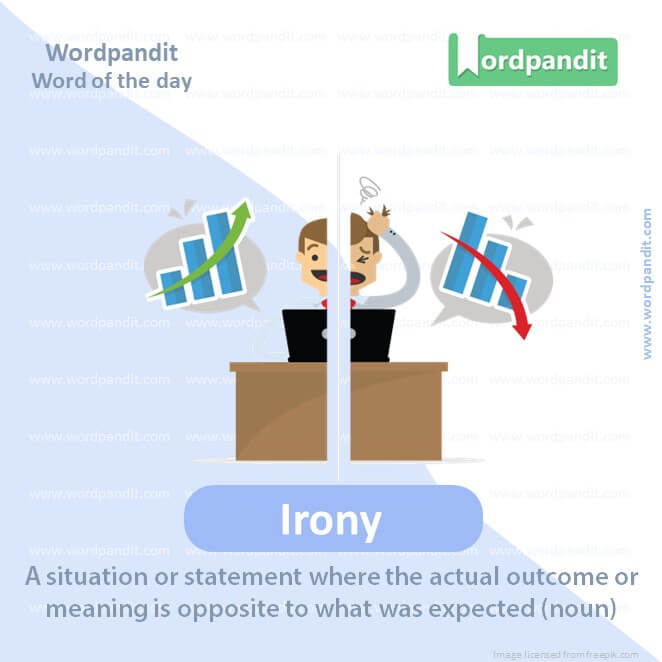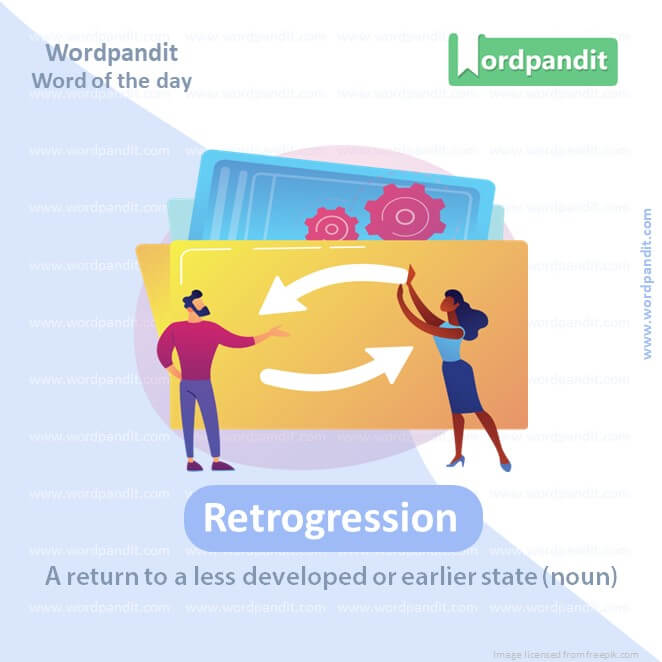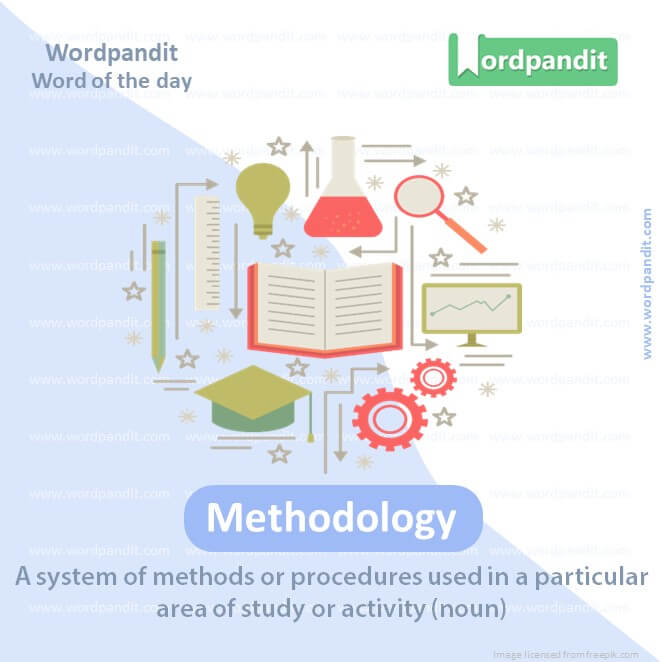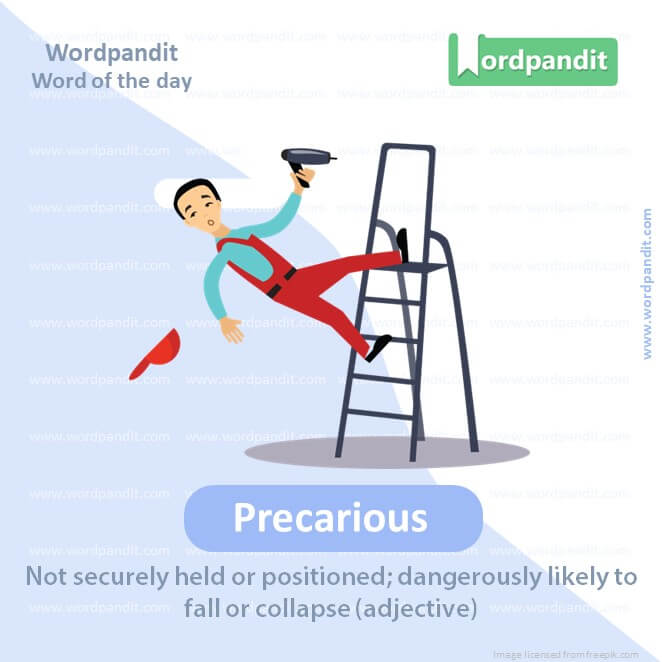Daily Vocabulary Words: List of Daily Used Words in Leading Indian Newspapers
Hi there. Welcome to this special section @ Wordpandit. Our endeavour here is straightforward: highlighting daily vocabulary words that you would come across in leading newspapers in the country. We have included the following newspapers in our selection:
• The Times of India
• The Economic Times
• Hindustan Times
• Mint
• Indian Express
We are putting in extensive work to develop your vocabulary. All you have to do is be regular with this section and check out this post daily. This is your repository of commonly used words; essentially, we are posting a list of daily used words. Hence, this has significant practical application as it teaches you words that are commonly used in leading publications mentioned above.
Visit the website daily to learn words from leading Indian newspapers.

WORD-1: Irony
CONTEXT: The irony is that India’s economic trajectory of progression after Independence has been accompanied by a severe retrogression in our economic discourse.
SOURCE: Hindustan Times
EXPLANATORY PARAGRAPH: Imagine you’re expecting it to rain because the sky looks cloudy, but when you go outside, it’s super sunny. That’s a surprise, right? Irony is when something happens that’s the opposite of what you expect. It’s like a funny or strange twist in a story.
MEANING: A situation or statement where the actual outcome or meaning is opposite to what was expected. (noun)
PRONUNCIATION: Eyeruhnee
SYNONYMS: Sarcasm, Satire, Paradox, Mockery, Contradiction
USAGE EXAMPLES:
1. Everyone expected him to be late, but the irony was he arrived an hour early.
2. The irony of the situation was that the fire station burned down while the firefighters were responding to a call across town.
3. She always teased him about forgetting his keys, but the irony was that she forgot hers today.
4. The book ended with a touch of irony that made the readers smile.

WORD-2: Retrogression
CONTEXT: The irony is that India’s economic trajectory of progression after Independence has been accompanied by a severe retrogression in our economic discourse.
SOURCE: Hindustan Times
EXPLANATORY PARAGRAPH: Think of walking backward instead of forward. Retrogression means going back to an older or less advanced way of doing things. Like if you built a big sandcastle and then knocked some of it down, it would be like going backward in your building progress.
MEANING: A return to a less developed or earlier state. (noun)
PRONUNCIATION: Retrogreshun
SYNONYMS: Regression, Decline, Backslide, Deterioration, Reversion
USAGE EXAMPLES:
1. The city experienced a retrogression in its economy.
2. Not practicing the piano led to his retrogression in skill.
3. The nation feared the retrogression of their rights.
4. Environmentalists are worried about the retrogression in climate policies.

WORD-3: Prudence
CONTEXT: If one party is making such promises and delivering such gains to the electorate, others cannot preach fiscal prudence in elections and hope to emerge as winners.
SOURCE: Hindustan Times
EXPLANATORY PARAGRAPH: Imagine you have one cookie left and you want to eat it, but you decide to save it for later when you might be hungrier. That’s being smart and careful about your choices. Prudence is like thatmaking wise decisions by thinking ahead.
MEANING: The quality of being careful and thoughtful in actions and decisions. (noun)
PRONUNCIATION: Proodens
SYNONYMS: Caution, Wisdom, Discretion, Carefulness, Judiciousness
USAGE EXAMPLES:
1. Her prudence in saving money allowed her to buy a new toy.
2. With prudence, he decided not to go out in the storm.
3. The manager showed prudence by not investing in risky ventures.
4. Always act with prudence when crossing the street.

WORD-4: Methodology
CONTEXT: One is the finding that the OBCs (as understood by the current methodology of deciding which classes are backward) account for over 60 per cent of Bihar’s population.
SOURCE: Indian Express
EXPLANATORY PARAGRAPH: Imagine you’re building a puzzle. You have a special way of starting with the edges and then filling in the middle pieces. That’s your method or plan for building the puzzle. Methodology is a fancy word for a specific way or plan to do something.
MEANING: A system of methods or procedures used in a particular area of study or activity. (noun)
PRONUNCIATION: Methohdolluhgee
SYNONYMS: Approach, Technique, Process, Procedure, System
USAGE EXAMPLES:
1. The scientist explained the methodology of his experiment.
2. Different teaching methodologies work for different students.
3. The company developed a new methodology for product testing.
4. Understanding the methodology behind a study is important for its credibility.

WORD-5: Precarious
CONTEXT: Communities trapped in menial work, traditional occupations, and precarious employment need to be identified.
SOURCE: Indian Express
EXPLANATORY PARAGRAPH: Imagine standing on one foot on a wobbly stool. It feels unstable and like you might fall, right? Precarious is a word that describes something that’s not very safe or secure, just like standing on that wobbly stool.
MEANING: Not securely held or positioned; dangerously likely to fall or collapse. (adjective)
PRONUNCIATION: Prehcaireeus
SYNONYMS: Risky, Unstable, Shaky, Uncertain, Perilous
USAGE EXAMPLES:
1. Climbing that old tree is a precarious activity.
2. Their financial situation is precarious, with debts mounting.
3. The vase was placed in a precarious position on the edge of the table.
4. With the strong winds, it was precarious to sail.
WORD-6: Exorbitantly
CONTEXT: Painful amounts of sexism are also involved. Potential male contraceptives are held to exorbitantly higher standards, for both convenience and side-effects.
SOURCE: Times of India
EXPLANATORY PARAGRAPH: Think of something costing way, way more than it should. Like if a tiny candy was priced as much as a big toy. Exorbitantly means something is way too much or too high, especially in terms of price or amount.
MEANING: To an excessively high degree, especially in terms of price or amount. (adverb)
PRONUNCIATION: Exorbitantly
SYNONYMS: Excessively, Overly, Extremely, Outrageously, Steeply
USAGE EXAMPLES:
1. The tickets were exorbitantly priced, so we decided not to go.
2. They charged exorbitantly for a simple service.
3. Many felt that the medicine was exorbitantly expensive.
4. Renting a room during the festival can be exorbitantly high.
WORD-7: Negligible
CONTEXT: It documents how phase-3 trials found this male contraceptive to have long-term efficacy and negligible side-effects. This does have the potential to be the world’s first approved male contraceptive injection.
SOURCE: Times of India
EXPLANATORY PARAGRAPH: Imagine a tiny speck of dust on a big table. That tiny speck is so small that you might not even notice it. Negligible means something is so small or unimportant that it can be ignored.
MEANING: So small or unimportant as to be not worth considering. (adjective)
PRONUNCIATION: Nehglidgeuhbul
SYNONYMS: Trivial, Insignificant, Minor, Minute, Tiny
USAGE EXAMPLES:
1. The difference in their ages is negligible.
2. The price increase is negligible, so I’ll still buy it.
3. There’s a negligible amount of sugar in that drink.
4. His knowledge on the subject is negligible.
WORD-8: Sterilised
CONTEXT: Wives get sterilised, not husbands. Tubectomies are the most popular method of family planning at 37.9%, condoms way behind at 9.5%. Aiming to get more male contraceptives into the market is about trying to get closer to equality.
SOURCE: Times of India
EXPLANATORY PARAGRAPH: Think about when you wash your hands to get rid of germs. Sterilised means making something super clean by killing all the germs or bacteria on it. Like when doctors clean their tools to make sure they’re safe to use.
MEANING: Made free from bacteria or other living microorganisms. (verb)
PRONUNCIATION: Stareillized
SYNONYMS: Disinfected, Sanitized, Cleansed, Purified, Decontaminated
USAGE EXAMPLES:
1. The surgeon used sterilised instruments during the operation.
2. It’s important to use sterilized bottles for baby milk.
3. The laboratory ensures all equipment is sterilised before use.
4. They sterilised the water to make it safe for drinking.
WORD-9: Procurement
CONTEXT: The relative share of Telangana and Chhattisgarh in rice procurement over the last five years has risen significantly. That translates into income stability for farmers.
SOURCE: Times of India
EXPLANATORY PARAGRAPH: Imagine you have a long list of things you need for a big party, like balloons, cake, and toys. Procurement is like going out and getting all those things from the list. It’s the act of finding and getting something.
MEANING: The action of obtaining or procuring something. (noun)
PRONUNCIATION: Procurement
SYNONYMS: Acquisition, Purchase, Attainment, Retrieval, Collection
USAGE EXAMPLES:
1. The manager is in charge of the procurement of supplies.
2. Procurement of fresh produce is done every morning.
3. The army’s procurement process is very strict.
4. The company is revising its procurement strategies.
WORD-10: Acquitted
CONTEXT: Both have now been acquitted by the high court.
SOURCE: Hindustan Times
EXPLANATORY PARAGRAPH: Imagine you’re playing a game, and someone says you broke a rule, but you really didn’t. Later, everyone finds out you played fairly and says you did nothing wrong. Acquitted is a word that means someone was found not guilty or cleared of doing something bad.
MEANING: Freed from a criminal charge by a verdict of not guilty. (verb)
PRONUNCIATION: Uhkwitted
SYNONYMS: Exonerated, Vindicated, Cleared, Absolved, Exculpated
USAGE EXAMPLES:
1. The judge acquitted him of all charges.
2. She was acquitted after the evidence proved her innocence.
3. The jury acquitted the defendant due to lack of evidence.
4. He was relieved to be acquitted and go home to his family.
Vocabulary SSC
Navigating the path to success in competitive examinations like the Staff Selection Commission (SSC) triggers a keen focus on ‘vocabulary SSC’. This collection of words, often prominent in SSC examinations, holds paramount importance, and forms a significant part of a candidate’s linguistic preparation. However, mastering ‘vocabulary SSC’ is a process that requires deliberate strategy and dedication.
To begin the journey with ‘vocabulary SSC’, a structured learning regime is key. Break the learning process into manageable chunks. Concentrate on a set number of words each day. This steady, consistent approach reduces the risk of burnout and enhances long-term retention of vocabulary.
The strategic use of memory aids can significantly boost the learning of ‘vocabulary SSC’. Utilize flashcards, memory apps, or even create personal mnemonics to help remember each word and its meaning more effectively. Associating a word to a personal event or object creates a lasting mental connection, making recall easier.
To truly master ‘vocabulary SSC’, it’s crucial to engage with the words in different contexts. Incorporating the words into daily reading and writing practices provides exposure to their usage in varied situations. This practical application reinforces the understanding of ‘vocabulary SSC’, enhancing the ability to employ these words accurately in the exam setting.
Regular revision is a must when preparing ‘vocabulary SSC’. Spaced repetition, interspersing the study with regular breaks, and regularly revisiting the words learned, ensures the words stay firm in your memory, ready to use when needed.
In essence, preparing ‘vocabulary SSC’ is an exercise in action-oriented constant learning. Strategic use of learning tools, practical application, and regular revision are key aspects of getting a grip on ‘vocabulary SSC’. As you stride through this process, you inch closer to acing your SSC examinations with an enriched vocabulary and boosted confidence.













